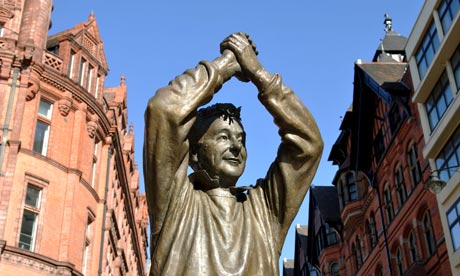
Tell a man you're from Nottingham and he'll either respond that it's a dangerous place or that you're a lucky swine, because the ratio of women to men is 4:1. Let's clear this up. The female myth dates from the time of the lace industry but it means we get stag nights expecting streets paved with garters. As for danger, it's not possible to be a threat when you call everyone "me duck" in a camp accent.
I tell stags it's actually 10 women to every man and if they get the beers in I'll show them where to look. They could be down in the sandstone caves beneath the city (nottinghamcavessurvey.org.uk), which, 700 years ago, acted as an underground malting system, and cemented another of our perceived characteristics, as big drinkers.
I then tell them to hop on a 28 bus to Radford, home of Arthur Seaton, antihero of Alan Sillitoe's 1958 novel Saturday Night and Sunday Morning, who was "out for a good time and all the rest is propaganda".
The White Horse (313 Ilkeston Road, thewhitehorsecafe.co.uk), where Arthur fell down the stairs after 11 pints and six gins, is now an Indian cafe but the green art deco tiles outside make a beautiful photo backdrop for those on a Sillitoe pilgrimage (sillitoetrail.com).
In the late 1950s, Nottingham was a factory city. Player's cigarettes, Boots the chemist and Raleigh bikes created mini towns in Lenton, Beeston and Radford. But Arthur's employer, Raleigh, closed its factory in 2002; it has been replaced with Nottinham University's Jubilee campus. Many of the pubs have gone, too.
"Don't let the bastards grind you down" was Arthur's credo, a sentiment with particular resonance in Old Market Square, where the mayor was flattened by cheese in the food riots of 1766, and unemployed framework knitters demonstrated in 1811/12. Lord Byron, a local, took up the Luddite cause in the House of Lords, attacking plans to make breaking weaving machines a capital crime: "Will you erect a gibbet in every field and hang up men like scarecrows?" he asked.
I get the stags to check out the statue of Brian Clough. "Big Mouth" Cloughie put Nottingham Forest on the map with back-to-back European trophies but we loved him for his acerbic wit.
The city council has ambitious plans to re-establish the moat and bridge at Nottingham Castle, and develop its museum and gallery with a Robin Hood attraction. But our literary heritage is rich, too. With Byron, DH Lawrence, Stanley Middleton and Sillitoe we have plenty to be proud of. We're a small city and can use this to our advantage. The Festival of Words (nottwords.org.uk, 9-24 February) has seen local organisations celebrate the one truism we need to build our reputation on: a city of stories.
James Walker is the literature editor of LeftLion magazine (leftlion.co.uk) and chair of Nottingham Writers' Studio (nottinghamwritersstudio.co.uk)

